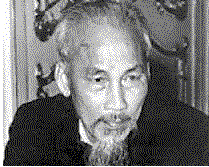FRtR > Outlines > American History (1990) > Chapter Eight > International tension continues (16/22)
An Outline of American History (1990)
Chapter Eight
International tension continues (16/22)
< Previous Page * Next Page >
In Southeast Asia, intensified internal guerrilla attacks
threatened the existing governments in Laos and South Vietnam.
Fourteen nations, including the United States, met in Geneva in
May 1961 to seek a solution to the Laotian conflict. After 13
months of negotiation, during which a ceasefire was put into
effect, they agreed to urge the Laotian princes leading the
contending factions to join in creating a neutral, unified, and
independent nation.
 In South Vietnam, however,
fighting continued as native
southerners joined with infiltrating northerners in a campaign of
kidnappings, assassinations, and other incidents of terrorism
against citizens loyal to the American-supported South
Vietnamese government. At the request of the Saigon government,
President Kennedy sent American military
personnel to help train
South Vietnamese troops. The United States also encouraged
South Vietnam's leaders to initiate social, political, and
educational reforms in order to secure broader popular support to
resist the Vietnamese who supported the nationalist-Communist
leader,
Ho Chi Minh.
In South Vietnam, however,
fighting continued as native
southerners joined with infiltrating northerners in a campaign of
kidnappings, assassinations, and other incidents of terrorism
against citizens loyal to the American-supported South
Vietnamese government. At the request of the Saigon government,
President Kennedy sent American military
personnel to help train
South Vietnamese troops. The United States also encouraged
South Vietnam's leaders to initiate social, political, and
educational reforms in order to secure broader popular support to
resist the Vietnamese who supported the nationalist-Communist
leader,
Ho Chi Minh.
Meanwhile, in June 1961,
Premier
Khrushchev created a
new crisis over the status of West Berlin when he again
threatened to sign a separate peace treaty with East Germany, which
he said, would end existing four-power agreements guaranteeing
American, British, and French access rights to West Berlin. The
three powers replied that no unilateral treaty could abrogate
their responsibilities and rights in West Berlin, including the
right of unobstructed access to the city.
East Germans, stirred by the crisis, fled to West Berlin in
increasing numbers. In July alone there were some 30,000.
Suddenly, on August 13, the Soviets erected a
wall
between the east
and west sectors of Berlin, forcibly sealing off the inhabitants
of East Germany. In the face of Allied determination to maintain
the right of access to West Berlin, the Soviet government allowed
the year-end deadline to pass without attempting to sign a peace
treaty with East Germany.
< Previous Page * Next Page >
 In South Vietnam, however,
fighting continued as native
southerners joined with infiltrating northerners in a campaign of
kidnappings, assassinations, and other incidents of terrorism
against citizens loyal to the American-supported South
Vietnamese government. At the request of the Saigon government,
President Kennedy sent American military
personnel to help train
South Vietnamese troops. The United States also encouraged
South Vietnam's leaders to initiate social, political, and
educational reforms in order to secure broader popular support to
resist the Vietnamese who supported the nationalist-Communist
leader,
Ho Chi Minh.
In South Vietnam, however,
fighting continued as native
southerners joined with infiltrating northerners in a campaign of
kidnappings, assassinations, and other incidents of terrorism
against citizens loyal to the American-supported South
Vietnamese government. At the request of the Saigon government,
President Kennedy sent American military
personnel to help train
South Vietnamese troops. The United States also encouraged
South Vietnam's leaders to initiate social, political, and
educational reforms in order to secure broader popular support to
resist the Vietnamese who supported the nationalist-Communist
leader,
Ho Chi Minh.